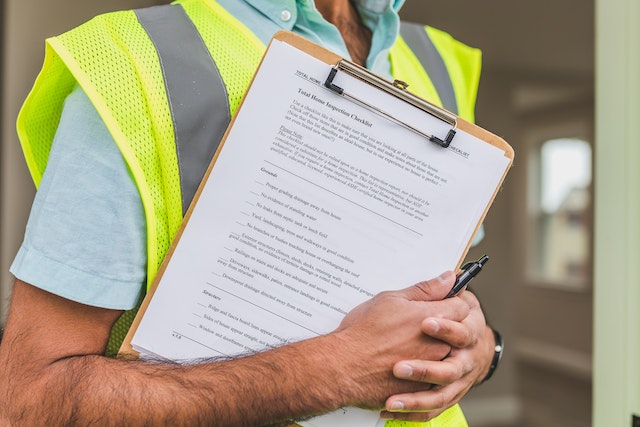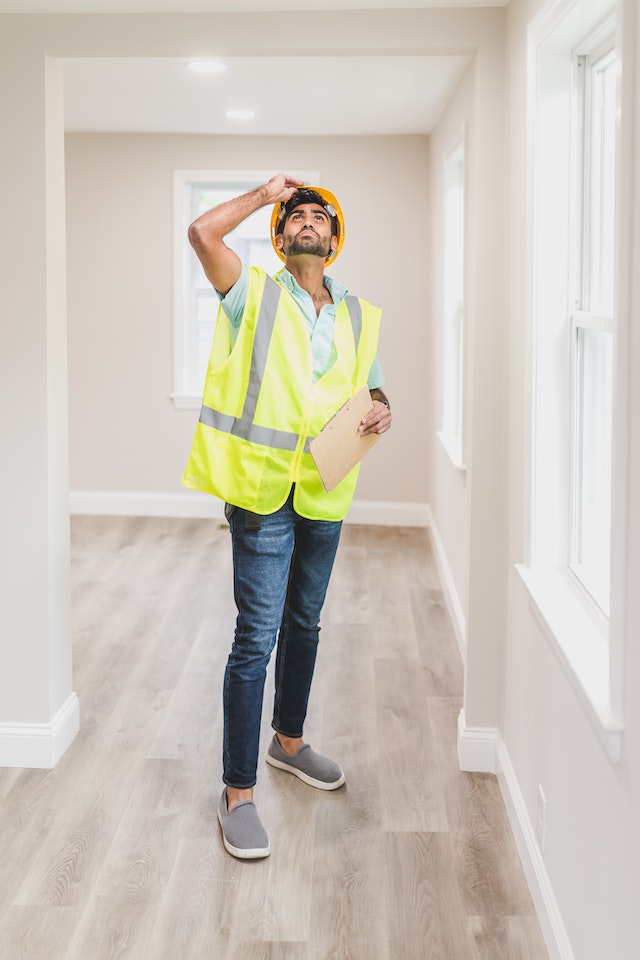Prevent your dream home purchase from becoming a money pit full of defects, severe structural damage, safety concerns, and health hazards. By understanding what a home inspection is and what one can reveal, you can avoid many of the pitfalls new homebuyers fall into.
homediggidy.com gathered the following information about home inspections, the negotiating leverage they provide, and what you can expect during and after one.
What Is a Home Inspection
A home or buyer’s inspection is an objective visual examination of a house’s structure and systems that occurs after making an offer but before closing the home’s sale. Usually, the prospective buyer will hire a professional home inspector to inspect the house. The home inspector’s intent is to identify structural, mechanical, health, and safety concerns (all in accordance with state and local standards).
After a thorough home inspection, the buyer can renegotiate their original offer or request repairs of those concerns discovered during the inspection.
Tip: A buyer’s inspection should not be confused with a seller’s home inspection. A seller’s home inspection occurs prior to the home’s listing. This inspection allows the seller to fix or replace potential issues that could slow down the closing process.
How Much Does a Home Inspection Cost
According to HomeAdvisor, a home inspection can cost anywhere between $200 and $500. The following is a breakdown of how the price of a home inspection may vary:
- House inspections for homes between 1,000 and 2,000 sqft. will cost approximately $315
- Homes or condos 1,000 sqft. Or less can cost as low as $200
- Homes over 2,000 sqft. will run $400 or more
- Mobile home inspections typically cost around $250 for a single-wide
- Veteran Affairs (VA) home inspections are charged and performed the same as other inspections
Tip: Even if you are closing on new construction, a home inspection is recommended to ensure the structure is safe and sound.
Who Pays for Home Inspection
Home inspections are designed to solely protect the property buyer. In most cases, the home buyer covers the home inspection’s cost.
How Long Does a Home Inspection Take
Depending on the size of the house, a home inspection may take anywhere from 2 to 4 hours. It is highly recommended that you accompany the inspector during the inspection. This will give you greater insight into the home’s condition you are purchasing and the ability to ask informed questions.
What Is Included in a Home Inspection

Areas of a home covered during a home inspection may differ depending on the inspector. When hiring a professional home inspector, find out in advance what is covered and what is not. The following should be covered to prevent future trouble and costly repairs:
- Roofing System
- Attic
- Crawlspace
- Fireplace
- Appliances
- Electrical System (wiring and connections)
- Home Appliances
- HVAC System (units to vents)
- Plumbing (supply and waste)
- Floors
- Foundation
- Windows and Doors
- Basement
- Pool and/or Spa
- Mold and/or Mildew
- Overall interior and exterior
Some aspects of a home inspection may require specially trained inspectors or technicians. Consider the following optional inspections:
- Asbestos
- Radon
- Termites
- Tree Hazard Assessment
- Well
- Septic System
When the inspection is concluded, the inspector should produce a detailed report listing any areas of concern with images. When your inspector detects a problem in any specific area, he/she may recommend a specialist for further assessments.
What Does a Home Inspection Look for…
While home inspections are thorough, they are not looking at cosmetic issues. A professional, experienced inspector is looking for things that appear significantly run down, nearing the end of service life, not functioning properly, or unsafe. The following are the principal issues home inspectors are looking for:
Roof Damage
A deteriorating roofing system can lead to leaks in the ceiling and structural damage. Damages may include:
- Damaged or missing shingles
- Cracked, rusted, or peeling flashing
- Substrate damage
- Moisture in the attic or apparent on the ceiling
According to Atlanta Commercial Roofing Contractors, there are some very common roofing mistakes that roofers make that caue leaks and problems for property owners. A qualified home inspector will know many of these and be on the lookout on your behalf.
Electrical System Problem
According to the National Fire Protection Association (NFPA), one of the top causes of home fires is due to electrical hazards. Such hazards include:
- Reversed polarity
- Aluminum wiring
- Wiring on sharp edges, frayed, cracked, or bare
- Bad breaker connections
- Painted outlets
HVAC System Trouble
Heating Ventilation and Air Conditioning (HVAC) problems can cause malfunctions and compromise air efficiency and quality. Home inspectors will report on the following:
- Outdated or malfunctioning thermostat
- Loose or cracked ductwork
- Old or dirty air filters
- Rust or deterioration of the unit or its components
- Gas connection and combustion
- Presence of asbestos
- Chimney and flue malfunctions
See the following website for more info on the HVAC inspection process.
Plumbing Problems
Faulty plumbing usually results in costly damages and repairs. Many plumbing problems remain hidden while causing structural damages and impacting the water bill. Such issues may include:
- Ruptured or burst pipes
- Rusted or deteriorated connections
- High water pressure
- Clogged sewer line
- Sediment build-up
- Malfunctioning toilets
- Hidden leaks
Insect and/or Pest Infestation
Insect and pest infestations can significantly influence a home’s overall value and buyer interest. Some of the more problematic insects and pests include:
- Ants (carpenter ants)
- Termites
- Beetles
- Rodents
Water Damage
Water damage, if left untreated, can cause problems with mold, structural integrity, and the occupant’s health. Signs of water damage include:
- Sagging ceiling
- Water-stained ceiling or walls
- Soft or deteriorating sheetrock
- Curling or rotting hardwood flooring
- Gaps opening between walls and floors
- A musty or moldy odor
Structural Integrity

Most structural integrity problems can be traced back to water damage in one form or another. The following are indications of a compromised structure:
- Uneven floors
- Cracks in walls and/or door frames
- Cracks in brick or stonework
- Cracked, leaning, or deteriorating masonry on a chimney
- Leaning patio, porch, or stairs
The above costly and labor-intensive issues can severely impact the sale of a home. They are the most likely to cause a renegotiation of the home’s price and buyer hesitation.
Trees
It is often asked, “Do home inspectors look at trees”, and “are sellers responsible for dead trees”? Although landscaping is not part of a standard inspection, trees are included in the report when they present danger to the house.
So while the tree itself isn’t inspected, an inspector will consider:
- how close they are to the structure
- are they leaning or not
- what potential damage they could cause
According to experts Fast Tree Removal, it is often the root system threatening the foundation, or braches too close to a structure or power lines that are most problematic. While these issues may be raised by the inspector, sometimes the signs that you need to remove a tree may not be as obvious, and an arborist or tree service needs to be contracted for a tree health assessment.
What To Ask During Home Inspection
A home inspection offers you the perfect opportunity to look deeper into the structure and workings of the place you could call home. As you accompany the inspector through the house, consider asking the following:
What Do You Mean? – When your home inspector notices or comments on a potential issue, ask him/her to go further into detail and what it means for the house.
How Serious Is This? – One of the things you’ll want to know is if an issue is significant or insignificant to the home’s safety.
How Much Longer Will This Last? – Whether it’s the roof, the HVAC unit, or other systems, knowing the service life of the house’s components will help you arrive informed to negotiations and decisions.
What Is This and How Does It Work? – Sometimes, during an inspection, you may see unfamiliar equipment like filters, boilers, etc. This is the perfect time to educate yourself about the equipment with someone who has undoubtedly seen it before.
Are There Any Property Issues? – Ask your inspector about potential property issues like; water drainage problems, overgrown tree limbs, sprawling surface tree roots, sinking foundation, etc. The layout and features of your future property can quickly turn a dream home into a nightmare. Make sure you don’t leave the inspection with any doubts about the property.
Can You Recommend A Service Pro? – While your inspector may have an “eagle eye” for spotting problems and potential issues, it is not likely they can fix all your problems. However, experienced inspectors have likely built relationships with a wide range of professionals. When issues will require professional attention, ask your inspector for a recommendation.
What Should I Be Concerned About? – Even though you will receive a written report after the inspection is complete, ask the inspector about the property’s most significant issues. This allows you to spring into action, contact experts, and discuss potential solutions with the seller before the report is complete.
Note: If you decide to buy the home, you can use the inspection report as your priority list for any needed repairs and maintenance.
Home Inspection
In this article, you discovered the significance of a home inspection, what one may reveal, and how it can serve as negotiation leverage, then as a roadmap for repairs and maintenance.
By having a home inspection performed before closing on a home purchase, you gain valuable insight about potential problems and how to get them resolved.
Skipping a home inspection will ultimately leave you entirely vulnerable to undesirable issues, damages, and costly repairs.
Sources:
homeinspector.org/Buyers-And-Owners/Homebuyers-Guide/FAQs-about-Home-Inspection
consumerreports.org/home-inspections/how-to-get-the-most-from-a-home-inspection/
homeadvisor.com/cost/inspectors-and-appraisers/hire-a-home-inspector/
